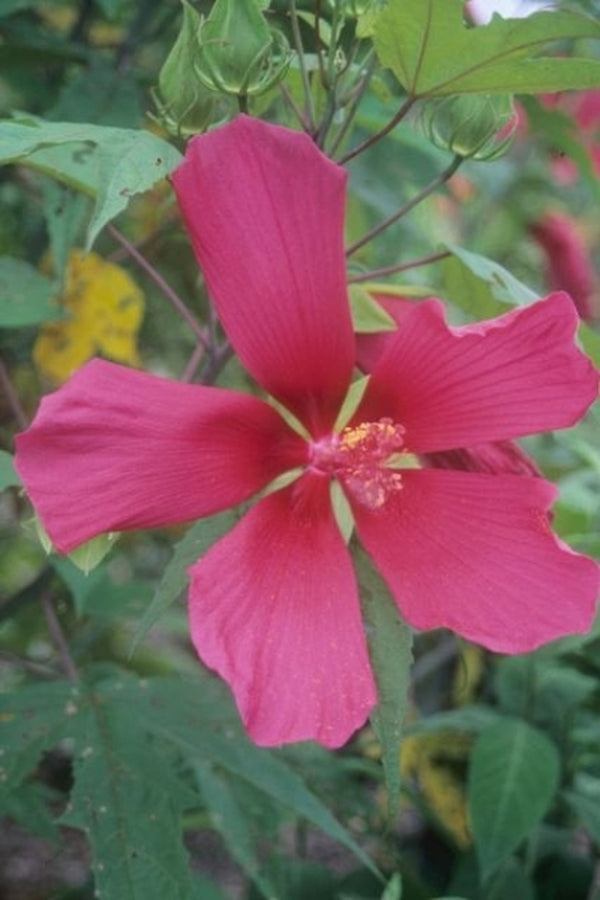Hibiscus 'Red Flyer'
Red Flyer Hardy Mallow
This plant is not currently for sale. This is an archive page preserved for informational use.
Shop Available HibiscusItem #: 4691
Zones: 6a to 9b, at least
Dormancy: Winter
Height: 144" tall
Origin: United States Hybrid
Pot Size: 3.5" pot (24 fl. oz/0.7 L)
Hibiscus 'Red Flyer' is a 2002 Plant Delights/JLBG introduction of a hybrid of two US natives, Hibiscus coccineus x Hibiscus grandiflorus. This monster plant has sturdy stalks that towers to 12' in height, clothed with marijuana-like foliage, which comes from Hibiscus coccineus parent. Its sawfly resistance comes from Hibiscus grandiflorus. The hybrid vigor came from really good sex. For us, Hibiscus 'Red Flyer' starts flowering in mid-July and continues until frost...attractive to hummingbirds. Plenty of nutrition and moisture will produce the best results. Hibiscus 'Red Flyer' is almost completely sterile, so don't expect any new dependents showing up.
Maintenance:
Hibiscus 'Red Flyer' is a very low maintenance perennials, provided they are growing in the proper conditions. When the plants go dormant in winter, the stalks remain upright and sturdy. We prefer to leave them to give birds a place to perch. The structure also helps the garden remain much more interesting in winter than a flat carpet of brown mulch.
Hibiscus sawfly is the #1 pest of most hibiscus, causing skeletonized leaves. These can be treated with a beneficial bacteria product like Dipel, which contains BT bacillus.
Growing Conditions:
Hibiscus like 'Red Flyer' grow naturally in standing shallow water, although they are quite drought tolerant for short period. The drier the soil, the more the plants will be stressed, which increases the severity of insect damage.
Garden Value:
Perennial hardy hibiscus add an upright garden form to the garden, as well as summer flowering when many spring perennials have finished flowering or gone dormant. Also, there are few plants with such a floral show that tolerates wet soil.
Natural Impacts:
Bees are the primarily pollinators of all of the herbaceous, hardy hibiscus.




-
Related Articles
-
Other Attributes
Genus: Hibiscus
Flower Color: Red
Leaf Color: Green
Container Role: Thrillers
Garden Themes: Cottage Garden Plants
Other: Bog Garden Plants , Butterfly Attracting Plants , Edimentals , Cut Flower Plants , Giant Plants , Hummingbird Plants , Pollinator Plants , North American Native Plants , Ornamental Seed or Fruit , Plant Delights Introductions , Plants that Attract Birds , Rabbit Resistant Plants , Rain Garden Plants , Salt Tolerant Seaside Plants , Tropical Looking Plants , Plant Delights Creations and Discoveries , United States Native Plants





